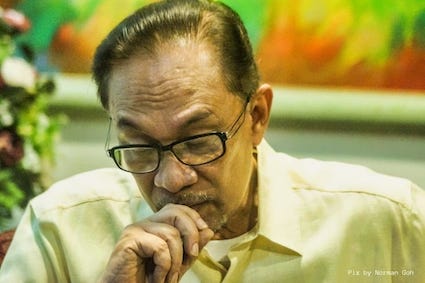Rise of Neo-Malay Ethnonationalism

COMMENT | Proclamations on religion and ethnonationalism are being made, with the tension dialled up to 11. But amid reports of attempts to destabilise the current government, the bigger issue is that the challenges faced by the Malay community and Malaysia remain unaddressed. Political analyst Dr BRIDGET WELSH writes.
As Malaysia’s leaders continue to harp on claims of displacement through ex-prime minister Dr Mahathir Mohamad’s “Malay Proclamation” and PAS president Abdul Hadi Awang’s persistent racialised attacks on non-Malays, big questions are being asked about how political narratives are being used to destabilise, divide and shape the country’s future.
Despite the shadows of the past — in the form of leaders themselves and repeated playbooks in calls for “Malay unity” and racialised mindsets — there is the evolution of an even more divisive political narrative; a neo-Malay ethnonationalism that reflects a worrying political trajectory of Malaysia’s move towards the right.
Not only does this narrative deepen political polarisation, but it also narrows the space for the country to move forward; towards stronger more inclusive politics that focuses on addressing challenges.
More than a ‘Green Wave’
The “green wave” has been the wrong label used to describe Malaysia’s move to the right. With its focus only on Islamism, this rubric fails to properly account for the totality of what is happening in conservative politics. Today’s new narrative on Malaysia’s right is much more than a matter of religion or conservative interpretations of the faith made by political leaders for political position(ing).
A careful study of voting in last November’s general election (GE15) shows that Malaysians didn’t vote for Islamism to the extent being touted, especially younger Malaysians. Rather and importantly, more voters opted to protest Umno’s governance, and many opted for new alternatives.
This includes those on the political right who are attracted to the evolving contemporary brand of neo-Malay ethnonationalism in which religion and nationalism are intertwined.
What’s Old and Changing
Malay nationalism has been tied to Malaysian politics since before independence. It served as the raison d’etre for the formation of Umno, which governed the country for over 6 decades, and underscored social policies, not least of which was the New Economic Policy (NEP), that increased social mobility among the Malay community while simultaneously entrenching racialised divisions into governance.
Like the NEP, Malay nationalist policies have focused on building the capital of the community, with important yet uneven gains in Malay ownership and entrepreneurship. They depended heavily on unquestioned control of the levers of government patronage.
Gains have become hard to sustain with demographic pressures, heightened global and regional economic competition and a more demanding and social media-connected electorate. Despite more innovative Malay entrepreneurs and successful professionals, the Malay middle class as a whole is contracting. Too many in the community are burdened with too much debt and unable to save, with persistent inter-generational poverty far too prevalent. Social problems from drug use to divided families have compounded economic challenges.
As such, older conceptions of Malay nationalism — initially tied to promoting the well-being of the Malay community and later used to legitimise holding onto power — are evolving into a new form, shaped by changes within the Malay community, in Malaysia and global patterns. Politically, the focus has moved away from building the capital of the community as a whole towards a focus on building the wealth of political elites. This has widened the gap within the Malay community, deepened competition among Malays, and left many lacking access to power in conditions of greater vulnerability.
Now, after the election of more progressive forces into power in 2018 and the hardships of the Covid-19 pandemic, conservative forces have deepened. There is disquiet with the changes in the political order. And there is unease with new faces and greater diversity in the current government under Prime Minister Anwar Ibrahim.
We see, as such, a revitalisation of old messages, calls for Malay power, anti-colonialism and anti-West, themes in the popular 2022 film Mat Kilau. And concurrently, there is confidence and pride that comes from a sense of place, and perception of righteous destiny. There is a renewed and growing sense that neo-Malay ethnonationalism provides empowerment.
As with white nationalism in the United States, melding conservative Christianity with Trumpism, fuelled by social media and powerful emotive messaging, today’s neo-Malay nationalism powerfully channels both contemporary resentments and aspirations.
On the surface, the neo-Malay ethnonationalist political narrative seems the same, pushed for by the same personalities. There is a similar focus on claims of displacement, tied to insecurity, vulnerability and fear.
The world is seen through tinted ethnic lenses of threat, and, at times, conspiracy and bigotry.
The older Malay ethnonationalist narrative continues from a place where the Malay community is projected as behind, in need of assistance and support, thus, underlying the justification of the need for political control and greater dominance in the economy.
At the same time, there is little appreciation of differences within the Malay community, the significant gains and successes of many in the community, and, importantly, recognition that decades of ethnonationalist-dominant politics have fallen far short of the goals of empowering the Malay community as a whole.
There is even less acknowledgement of the failures of key Malay leaders, those jailed, others facing charges and yet others who should be held more accountable. Few appreciate the destructive narcissistic pattern of competition and greed for the spoils of power that has emerged in national politics.

